What Nuts are Good for Diabetes? Good Fats, Glycemic Control
Nuts are a good source of healthy fats and can help control blood sugar levels in people with diabetes. In this article, we list the 10 best nuts for diabetes and tell you why they should be included in your diet.
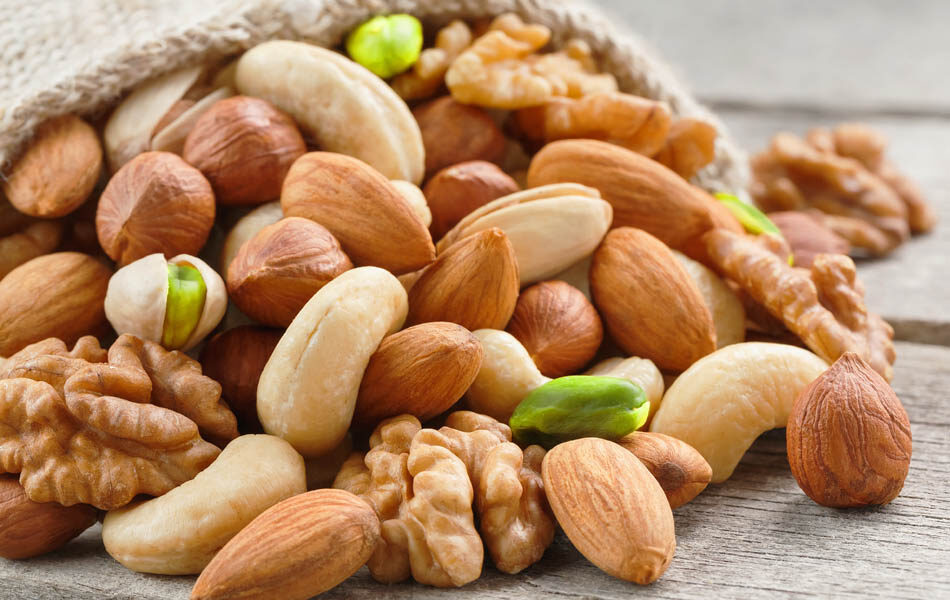
Nuts contain omega-3 fatty acids, which are well-known for their benefits for cardiovascular disease. However, did you know that the health benefits of eating nuts for people living with diabetes include better blood sugar management, as well as reduced risk of heart disease?
Adding a few nuts to your diet can improve its quality by increasing your intake of healthy fats, protein, fiber, and other essential nutrients. However, not all nuts offer equal benefits.
In this article, we list more than 8 of the best nuts for people with diabetes, explore why you should include nuts in your diet, and which nuts you should rather avoid.
These Are the Best Nuts for Diabetes
#1 Almonds
#2 Cashews
#3 Macadamia nuts
#4 Walnuts
#5 Unsalted pistachios
#6 Chestnuts
#7 Pine nuts
#8 Pecans
#9 Hazelnuts
#10 Brazil nuts
8+ Nuts That Help Keep Diabetes in Check
Research shows that nut consumption has beneficial effects on insulin resistance, blood glucose, blood pressure, and cholesterol levels. Along with healthy fatty acids, nuts are a source of fiber, vitamin E, and other essential nutrients, which are also associated with weight loss.
Some nuts are better than others for people with diabetes. Below we list over 8 best nuts that are a good source of unsaturated fats and essential nutrients and have been shown to reduce the risk of heart disease, improve brain health, and reduce inflammation.
#1 Almonds
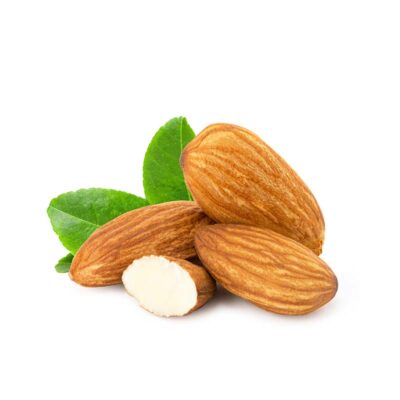
Research shows that almond consumption in people with diabetes can reduce their total and LDL-cholesterol levels, as well as their average blood glucose level. Therefore, almond consumption as a snack for those living with diabetes is encouraged.
Unhealthy food cravings are reduced when you snack on a small handful of almonds, improving overall diet quality and supporting weight loss, which is a crucial component of diabetes management.
Not only do almonds provide essential fatty acids, but they are also a good source of fiber, magnesium, vitamin E, and protein. Almonds also contain calcium. An average 30g portion (23 almonds) provides approximately 76mg of this mineral, which is important for maintaining healthy bones.
#2 Cashews
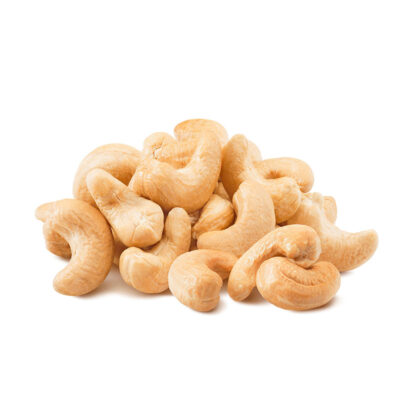
Studies have revealed that cashews raise HDL-cholesterol (good cholesterol) levels and reduce systolic blood pressure (the upper blood pressure reading), thus reducing the risk of heart disease.
Cashews have a low glycemic index, similar to other nuts. Therefore, a small handful of cashews won’t cause your blood sugar level to spike. Additionally, they are a good source of magnesium which is an important mineral for glycemic control.
Many people with diabetes avoid nuts, such as cashews, due to the misconception that they cause weight gain because of their high fat content. However, the combination of dietary fiber, protein, magnesium, and unsaturated fats makes them a satiating snack that can speed up your metabolism so that your body burns energy more efficiently.
#3 Macadamia nuts
The total fat content of macadamia nuts is higher than other nuts. However, most of the fat in these tasty tree nuts are healthy fats, and studies show that when they are included in the diet, they can help reduce low-density lipoprotein (LDL) cholesterol, reducing the risk of heart disease.
According to research, another health benefit of eating macadamia nuts for people with diabetes is improved blood sugar management. Diets that include 2 portions (½ a cup) of nuts, such as macadamias, per day can lower HBA1c (3-month average blood sugar level) and fasting glucose levels.
#4 Walnuts
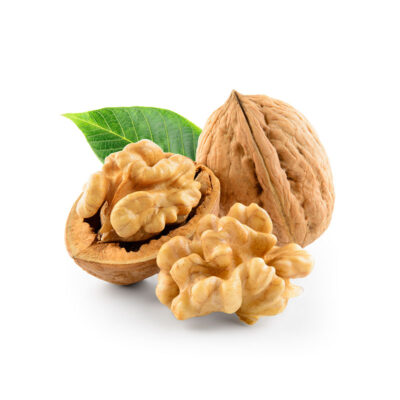
Eating walnuts is associated with improved heart health. They are a good source of healthy fatty acids, particularly omega-3 fatty acids, which improve blood lipid profiles by reducing LDL-cholesterol and raising HDL-cholesterol, which is essential for people with diabetes to reduce their risk of heart disease.
Walnut consumption has also been linked to other human health outcomes because omega-3-rich fats reduce inflammation in the body. The benefits include improved brain health, weight loss, cancer prevention, and reduced risk of age-related macular degeneration.
A study published in 2018 showed that eating walnuts is associated with a reduced risk of developing type 2 diabetes. However, evidence for the benefits of blood glucose control in people with diabetes when eating walnuts is inconclusive.
#5 Unsalted pistachios
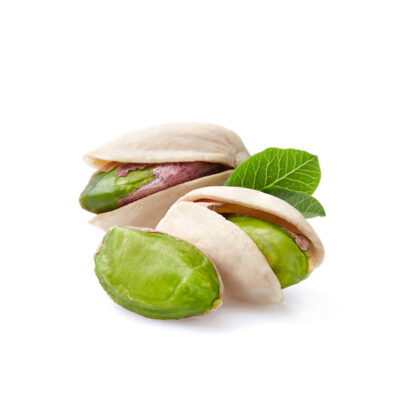
Unsalted pistachio nuts are an excellent addition to the diet of people with diabetes. They are a low glycemic index snack with anti-diabetic and anti-inflammatory properties.
According to the results of a study, adding unsalted pistachio nuts to your diet can improve blood sugar levels, reduce blood pressure, promote weight loss, and reduce chronic inflammation.
Pistachios have also been shown to reduce insulin levels in those with diabetes, thereby improving insulin resistance and promoting better glycemic control.
#6 Chestnuts
Chestnuts have significantly more sugar and carbohydrates than most other nuts, but they are also a good source of dietary fiber, protein, essential fatty acids, vitamin E, B-group vitamins, potassium, phosphorus, and magnesium.
Despite their high carbohydrate content, people with diabetes can still enjoy chestnuts as they have a low glycemic index. Therefore, blood glucose levels don’t rise too high after eating them.
#7 Pine nuts
Pine nuts have been associated with brain and heart health, weight loss, and improved glycemic control in people with diabetes. These benefits are largely attributed to the healthy fats they contain, in particular, pinolenic acid, which helps reduce inflammation in the body.
However, pine nuts are also a significant source of the mineral manganese, which has been shown to reduce the risk of developing type 2 diabetes. Manganese helps to control blood sugar levels by increasing insulin secretion from the pancreas.
#8 Pecans
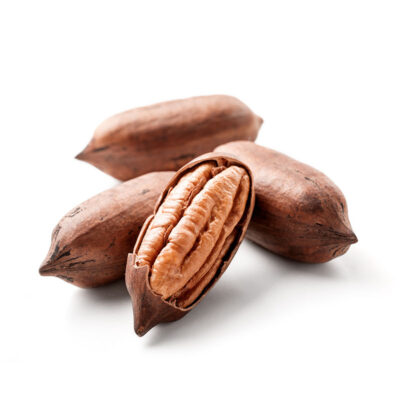
For people with diabetes, nuts such as pecans, eaten in portions of a small handful daily, lower the risk of cardiovascular disease, control blood glucose levels and promote weight loss.
Such health benefits are attributed to the unsaturated fatty acids, which are abundant in pecan nuts. A portion (19 halves) of pecans also provides 2.7g of dietary fiber, which helps prevent blood sugar spikes and unhealthy food cravings.
#9 Hazelnuts
The benefits of hazelnuts have not been studied as much as those of other nuts. However, there is evidence that suggests including them in the diet of people with diabetes may help to reduce blood sugar levels.
Oleic acid, present in high amounts in hazelnuts, was shown in a study to reduce fasting glucose and insulin levels. Participants in the study also experienced improved insulin sensitivity.
#10 Brazil nuts
Brazil nuts are an excellent source of selenium, which is a potent antioxidant with proven benefits for thyroid disease, cardiovascular disease, and the reduced risk of cancer. In people with diabetes, research suggests that selenium can improve glucose levels and lipid profiles.
Studies on Brazil nut consumption show that eating Brazil nuts improves satiety and stabilizes the blood sugar and insulin response after eating. Insulin resistance is also improved when selenium intake increases.
Why Are Nuts Good for Diabetes?
Nuts have numerous health benefits for people with diabetes. The combination of healthy fats, protein, dietary fiber, and essential nutrients in nuts can help reduce blood pressure, lower LDL-cholesterol, and raise HDL-cholesterol, thus reducing the risk of heart disease.
Nut consumption is also associated with lower blood sugar levels and weight loss. In general, nuts have a low glycemic index, which results in only a small rise in blood sugar levels when they are eaten.
A few nuts, such as almonds, contain calcium, which is important for healthy bones, and many nuts are a rich source of vitamin E, which is a powerful antioxidant that prevents cell damage in the body.
What Nuts Should People With Diabetes Avoid?
Because people with diabetes have a high risk of developing heart disease, their diet must include foods that prevent a dramatic spike in blood sugar levels, as well as those that support cardiovascular health.
Most nuts, whether raw or dry roasted, contain significant amounts of heart-healthy unsaturated fats, which lower LDL-cholesterol and raise HDL-cholesterol. However, many commercially available nuts are salted.
Those with diabetes have double the risk of developing high blood pressure, and salt is implicated in hypertension. Therefore, to avoid heart attack and stroke, it is crucial to reduce salt intake to less than a teaspoon per day. As a result, unsalted nuts are the best choice for people living with diabetes.
If you have diabetes and are following the keto diet, it is best to avoid most nuts, including various trail mixes.
How Many Nuts Should a Person With Diabetes Eat Daily?
Dietary guidelines recommend eating a small handful of nuts daily, which is the equivalent of 1oz of nuts. That translates to 20 almonds, 15 cashews, 15 macadamias, 7 whole walnuts, 30 pistachios, 4 chestnuts, 2 tablespoons of pine nuts, 15 pecan nut halves, 20 hazelnuts, and 6 Brazil nuts.
Some studies suggest eating 2 portions of nuts per day for improved blood sugar management and lipid profiles for those with diabetes. However, it is important to note that you should not exceed more than 1oz of Brazil nuts per day, as a high intake of selenium can have negative effects on your health.
A Word From a Dietitian
Eating nuts daily improves overall diet quality and health in people with diabetes. Just one small handful of nuts eaten as a snack can promote heart and brain health and reduce blood sugar levels.
Nut consumption increases your intake of healthy fatty acids, vitamin E, and other essential nutrients. Consuming unsaturated fats is known to lower LDL-cholesterol levels and reduce the risk of developing heart disease.
Nuts have a low glycemic index. Therefore, the glycemic response after eating nuts is small, which promotes satiety and weight loss, and helps to keep unhealthy food cravings in check.
People with diabetes can enjoy a wide variety of nuts. However, due to the increased risk of high blood pressure associated with diabetes, it is preferable to avoid salted nuts.
Conclusion
Nuts are a tasty, satisfying snack with numerous health benefits for people with diabetes. Their healthy fat content improves heart health by lowering cholesterol levels, thus reducing the risk of cardiovascular disease associated with diabetes.
Scientific studies repeatedly show that nuts improve diabetes management by reducing blood sugar and insulin levels and improving insulin sensitivity. Therefore, including a handful of nuts in your daily diet is recommended if you have diabetes.

- Personalized and diabetes-safe meal plan
- An integrated shopping list that matches the meal plan
- No-equipment home workouts
- All-in-one health and progress tracker
- Detailed activity log

















































 Select your language:
Select your language: 










